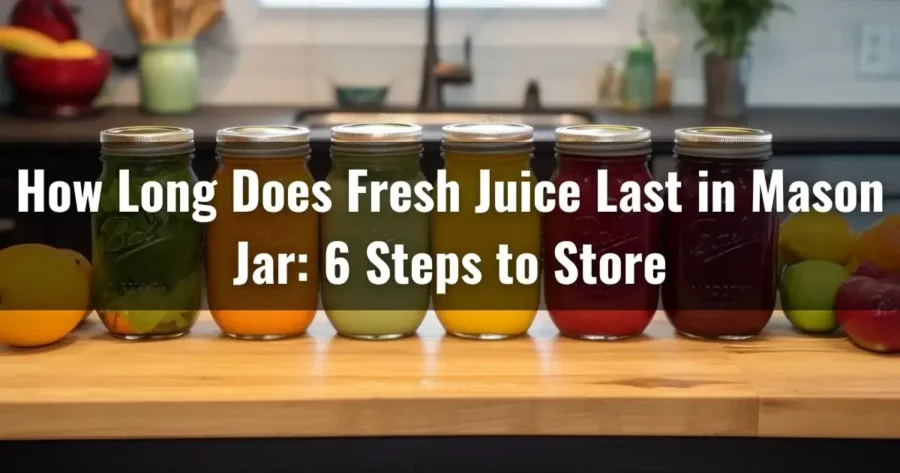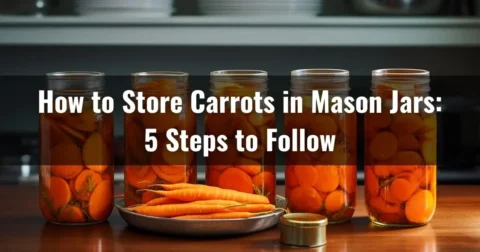Freshly made juices are a delightful and nutritious addition to a healthy lifestyle, packed with vitamins, antioxidants, and natural flavors. For extending the shelf life and savoring the goodness of homemade juices, mason jars are the ideal storage solution.
But how long does fresh juice last in a mason jar in your kitchen that will retain its flavor and nutrition?
Generally, if stored in the right conditions and handled properly, fresh juice will last from 24 to 72 hours in mason jar bulk food storage. You can also choose to freeze for a more extended shelf life. In freezing conditions, juice can last for 12 to 16 months.
Here, we’ll explain how to store your delicious homemade juice in a mason jar right in your kitchen. Also, you’ll discover why mason jars are good for storing different juice recipes.
Jump to Section
How Do You Store Fresh Juice in a Mason Jar in the Kitchen?
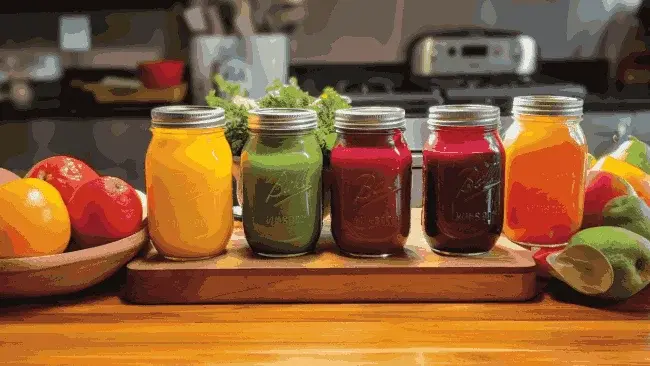
Bulk fresh juice storage in mason jars should be done properly to preserve its shelf life and taste. To store fresh juice in a mason jar in the kitchen, there are several steps you need to follow.
- Step 01: Choose the right Mason jar
- Step 02: Prepare your fresh juice and fill the jar
- Step 03: Seal the jar properly
- Step 04: Label and date the jar
- Step 05: Store in the refrigerator or freeze
- Step 06: Check for signs of spoilage
Step 01: Choose the Right Mason Jar
We recommend choosing a mason jar with a wide mouth and airtight lid to store your fresh juice in the kitchen. Mason jars with wide mouths are easier to pour juice into and clean afterward.
The airtight lid is crucial for preserving the freshness of the juice by preventing air from entering the jar. Look for a jar with a rubber-sealed lid, as this provides a secure and tight seal.
Also, we recommend opting for a glass mason jar rather than a plastic one, as glass doesn’t retain odors or flavors and is more resistant to staining.
Step 02: Prepare Your Fresh Juice and Fill the Jar
Now, you’ll need to prepare and fill the mason jar with fresh juice in the kitchen. Selecting the right juicer is essential for obtaining the best results when preparing fresh juice. The choice of juicer can impact factors like taste, nutritional value, and ease of use. Here are some common types of juicers to consider:
Centrifugal Juicers
These fast and efficient juicers work well with most fruits and vegetables. They’re a good choice for quick juicing, but they may not preserve nutrients as effectively due to the heat generated during the process.
Masticating (Slow) Juicers
Masticating juicers, also known as cold press or slow juicers, operate slower, minimizing heat production. They are excellent for retaining the nutritional integrity of the juice and are suitable for a wide range of produce.
Triturating Juicers
These juicers are even slower than masticating juicers and produce minimal heat. They can extract a high juice yield and are ideal for juicing leafy greens and tough produce.
Hydraulic Press Juicers
Hydraulic press juicers are expensive and complex machines but offer the longest shelf life for juice stored in a Mason jar in the freezer. They use immense pressure to extract juice without heat.
Blenders
While not technically juicers, blenders can make smoothies and blended juices. In contrast, they may introduce more oxygen and heat, potentially leading to quicker juice oxidation.
Citrus Juicers
Specifically designed for citrus fruits like oranges, lemons, and limes, these juicers are ideal for extracting juice from these types of produce.
After ensuring your juice is free from pulp or debris, it’s time to transfer it into the Mason jar. We recommend leaving some space at the top of the jar to allow for expansion during freezing if you plan on storing it for a long time.
You should work quickly during this step to minimize exposure to air and light, as they can degrade the nutritional value of the juice. Pour the juice carefully into the jar, using a funnel if necessary to avoid spills.
Step 03: Seal the Jar Properly
To properly seal the mason jar, make sure that you tighten the lid securely. This step will create an airtight environment in your kitchen, preventing oxygen from entering the bulk food storage. When oxygen comes into contact with fresh juice, it can lead to oxidation and spoilage, affecting the taste and quality of the juice.
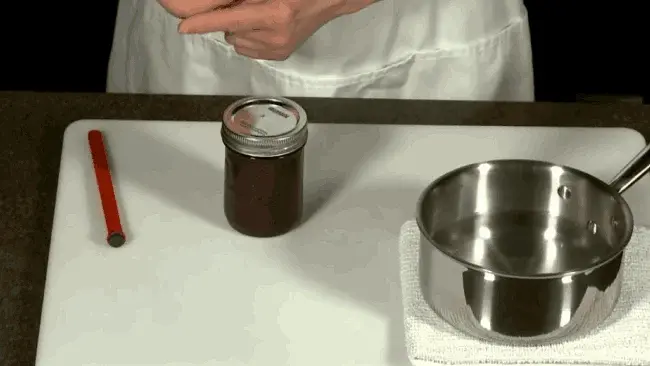
We strongly suggest remembering to check the lid for any residue or dirt before sealing, as a clean surface will help create a tight seal.
Step 04: Label and Date the Jar
Grab a marker or label and write the date on the Mason jar. By labeling and dating the jar, you can easily identify when it was prepared and ensure that you consume it within its recommended shelf life. This way, you can avoid drinking juice that has passed its prime and potentially risking your health.
A clear date on the jar allows you to consume older juices before newer ones, reducing waste and ensuring you enjoy your juice to its fullest potential.
Step 05: Store in the Refrigerator or Freeze
Place the sealed Mason jar in the refrigerator or freezer to store fresh juice. The refrigerator is the best option if you plan on consuming the juice within 24 to 72 hours. We recommend keeping the temperature below 40 degrees Fahrenheit.
In contrast, freezing is the way to go if you want to store the juice for a longer period, such as up to 12 to 16 months.
Step 06: Check for Signs of Spoilage
Regularly inspect your stored juice to ensure it hasn’t spoiled and is safe to consume. Look for any changes in color, taste, texture, the presence of mold, or an odor. These are all signs that the juice may have spoiled. If the juice appears cloudy or has a strange smell, it’s best to err on the side of caution and discard it.
What Makes Mason Jars a Better Fruit Storage Container?
Mason jars are a better fruit storage container for several reasons.
i. Airtight Seal and Freshness
The rubber-sealed lids on mason jars create a tight seal that prevents air from entering the jar. When fruits are exposed to oxygen, enzymes in the fruit break down the nutrients and cause browning and loss of flavor.
By keeping the air out, the airtight seal on mason jars helps preserve the fruit’s freshness, texture, and flavor.
ii. Glass Material
Because of their glass material, mason jars provide an ideal container for storing fresh fruits in the kitchen. Glass is non-porous and non-reactive, so it won’t absorb odors or flavors from the inside fruits. This ensures that your fruits stay fresh and maintain their natural taste.
Also, glass doesn’t contain harmful chemicals like some plastics, so you can be confident that your fruits will remain pure and free from any potential contaminants. Glass is also easy to clean and sanitize, reducing the risk of bacteria or mold growth.
iii. Versatility
You can use mason jars to store a variety of fruit juices, making them a versatile option for bulk food storage in your kitchen. The different sizes available allow you to store small batches of different juices or large batches of a single juice.
Mason jars can also store other liquids like syrups, sauces, and even dry goods such as grains, seeds, and nuts. Plus, they work great for preserving fruits and vegetables in the fridge or freezer. It also provides a clear view of the contents, allowing you to identify and organize your fruits easily.
iv. Environmental Friendliness
With its reusable and durable nature, mason jars offer an eco-friendly fruit storage container option for your kitchen. Unlike disposable plastic containers, mason jars can be used repeatedly, reducing waste and minimizing the environmental impact.
Also, the durability of mason jars ensures that they can withstand repeated use and resist chipping, making them a long-lasting option for juice storage.
FAQ’s: How Long Does Fresh Juice Last in Mason Jar
What are the best juice recipes to store in Mason jars?
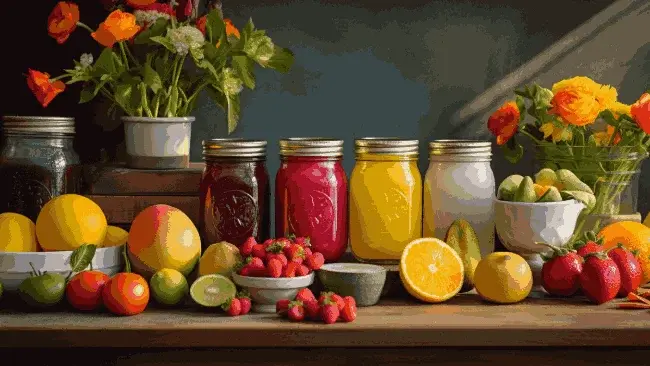
You can store various juice blends in Mason jars, including green juice, citrus sunshine juice, carrot-orange-ginger delight, beet-berry bliss, and pineapple paradise.
The high fiber content in kale and spinach helps maintain their texture and freshness, while lemon acts as a natural preservative in green juice blends. Citrus fruits contain natural preservatives and high levels of vitamin C, which help maintain their freshness in citrus sunshine juice.
Carrots and oranges provide natural sweetness and freshness, while ginger adds a spicy twist to carrot-orange-ginger delight. In pineapple paradise, berries and mint add nutrients and flavors, while pineapple and mango add a refreshing and fruity taste.
Does the size of the mason jar affect the shelf life of fresh juice?
Choosing the right mason jar size can significantly impact your fresh juice’s shelf life. Smaller jars are ideal for storing juice because they’ve less air space, reducing the oxidation potential. Conversely, larger jars may expose more juice to air, increasing the chances of oxidation and spoilage.
When juice is exposed to air, it can cause the juice to spoil faster. It is recommended to choose a jar size that corresponds to the amount of juice you will drink within a reasonable timeframe.
Can I store carbonated fruit juices in Mason jars?
The shelf life of carbonated fruit juices will be significantly shorter than that of non-carbonated juices when stored in Mason jars. This is due to the gas escaping over time, which leads to a loss of fizziness. To retain the carbonation for as long as possible, experts recommend consuming the juice within 24 hours of bottling.
Conclusion
As you can see, understanding how to store them effectively is essential in determining how long fresh juice lasts in a mason jar. Storing fresh juice in a mason jar effectively extends its shelf life and maintains its quality.
The fresh juice can be enjoyed for 24 to 72 hours if you seal the jar tightly and refrigerate it at the appropriate temperature. While mason jars are valuable in preserving your juices, remember that the most nutritious and flavorful juice is consumed immediately after preparation.
So, from vibrant green juices to zesty citrus blends, a mason jar can be a valuable ally in your kitchen in keeping homemade juices fresh.


